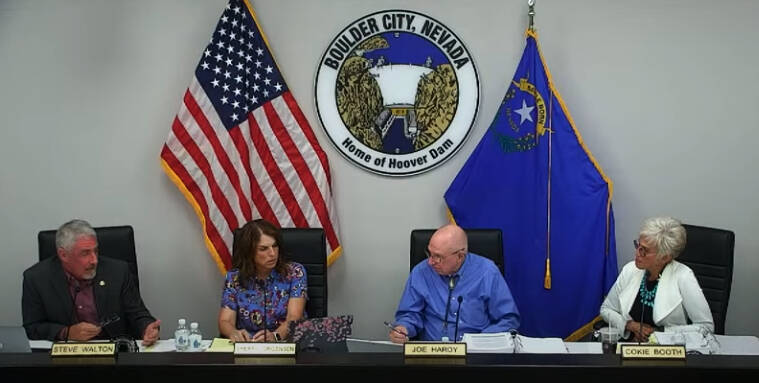Council weighing critcal labor shortage option
When it comes to hiring high-level city employees, small communities including Boulder City are at a distinct disadvantage. Actually a few of them.
The biggest is pay. This is not a surprise and has been the subject of multiple city council discussions. In the recent past, most of those discussions were about police and fire professionals and the difficulty in hiring when the same person could make substantially more money “over the hill.”
But, lately, the discussion has shifted to the vacant city manager position. Indeed, in the past dozen years, including members of city staff who have served as temporary “acting” city managers, six people have served in the position. None of them have lasted as long as it takes a student to graduate from Boulder City High School.
That situation led Councilmember Steve Walton to request a discussion in the council’s most recent meeting on July 9 about a possible strategy to widen the potential labor pool to include people who were retired from another public service position.
Being able to do that involves a complicated process labeled as declaring a “critical labor shortage” for the position.
But what does that mean and how does it work?
Originally about teachers
There is, technically, nothing stopping a retiree from accepting another position in the public sector within Nevada. Except one thing, money.
Public sector employees in Nevada (and in many other states) do not contribute to or draw from a typical federal Social Security retirement fund. They have a separate system known as the Public Employee Retirement System, or PERS. After a certain number of years working and contributing to that system, public employees become “vested” and are entitled to draw a pension when they retire. The amount of the pension (a percentage of their last official annual salary, in many cases including overtime pay) depends on the number of years they were in a public sector job.
And if a retiree who is drawing a pension takes another job in the state that is also subject to the PERS system then, under NRS 286.525, they lose their pension for as long as they are employed in the new position.
Due to a serious issue staffing teachers, especially in smaller and more rural communities, an exception was passed into law in 2001 which said that an exception was possible if the employee was filling a critical labor shortage.
Under the original law, all the hiring agency had to do was declare that there was a shortage. That part of the law sunset-ted in 2005. The exception was renewed in 2005 and then in 2009, it was, with the passage of AB488 made part of the Nevada Revised Statutes. At that point, it was supposed to sunset in 2015 but sunset requirements were removed and in 2021, a requirement was added saying that the hiring government agency had to make a series of “findings” to support the declaration of a shortage.
Which brings things to the current situation and the idea brought forth by Walton.
Getting someone to stay
Given the difficulty the city has had in retaining a qualified city manager, he posted, might it be in the city’s interest to make those finding, declare a shortage and open up the potential labor pool to retirees?
Given what the city can pay, if they can’t hire someone already getting a pension, the most likely candidates will be younger and could use the Boulder City job as a stepping stone to something bigger.
That is what appears, in the mind of some council members based on comments at the July 9 meeting, to have happened with the latest city manager, Taylour Tedder, who departed after about two-and a-half years for a job in Delaware that reportedly pays more than double and comes with a forgivable loan to buy a home.
Walton, a retired fire captain receiving a PERS pension, reported having experience with friends who had been in public jobs, tried to retire and hated it. He says that some, unable to take another public sector job in Nevada, moved to other states.
In a conversation with the Review this week, he said, “I think we all know someone who has retired from a given career and sooner or later, realize they still have much to offer. In our case, rather than see that person go out of state to serve in the public sector, like I have seen many do, with the Critical Labor Shortage (CLS) declaration they may potentially stay in-state and enrich Boulder City with their proven skills and professional expertise.”
“I know that Boulder City is an amazing community,” he continued. “And any number of individuals would be honored to serve as city manager here; potentially someone who is otherwise retired from a Nevada PERS position.”
When the council first discussed the issue, it was among the most contentious discussions in recent memory and resulted in a rare 3-2 vote in favor of having staff help with the process of making findings to support a declaration.
The findings that have to be made to support a declaration include the history of the rate of turnover for the position, the number of qualified candidates after all other efforts have been exhausted, the length of time the position has been open and the history of efforts to fill the position.
The rub is that the council can’t have staff make the findings and then just sign off on them. Per the requirements of AB488, the findings have to be made by the council in a public meeting. Further, they have to be renewed every two years.
That means that, if the city were to declare a shortage and hire someone receiving a PERS pension, they would have to renew the findings every two years in order for the person to remain in the position and still draw a pension.
Mayor Joe Hardy and Councilmember Cokie Booth, who both voted against the idea, were on record as thinking that a declaration is premature, given that the city has not really even started the recruitment process yet. Walton countered, in that meeting, that waiting until the recruitment process was done might make the idea of a declaration moot and that the possible perfect candidate might not even apply because they do not want to lose their pension benefits.
Hardy also expressed that he saw the idea of “double-dipping” as politically fraught. But, the reality is that many, if not most senior members of city staff (i.e., department heads), are already vested in retirement systems from other states. When asked for a list of which city employees were actually collecting pensions from other states, a city spokesperson reported that the city does not require employees to disclose that info.
The council is tentatively set to discuss the issue again at their meeting scheduled for Aug. 13.
“At the end of the day, it is not known that declaring a Critical Labor Shortage would yield any additional qualified applicants. Importantly though, city council has the opportunity to discuss this topic in depth and together determine if it is the right thing at the right time for Boulder City,” Walton said.
“Whether the CLS is declared or not, I have great confidence that this city council can work together to find a great fit for our next city manager.”















